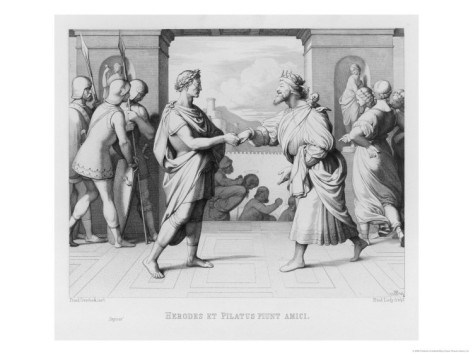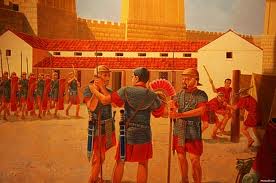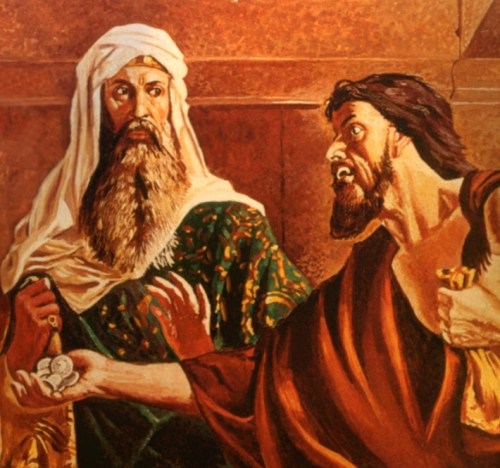
Friends of Padre Steve’s World,
Yesterday I preached at my chapel. The message was one that had it not been for a snow event that closed our base would have been delivered last week. Now if it was up to me I would have simply moved along to this week’s lectionary readings, but my soon to be deputy command chaplain who I had the opportunity to promote to the rank of Lieutenant Commander and administer the oath of office to is not nearly the liturgical fanatic that I am so we stayed with the readings for the Epiphany. Truthfully I would have done this weeks readings because I am such a slut for liturgical correctness but since the bulletins were already done and it meant a lot to my young Padawan. Actually he’s not that young but he is a good deal younger than me but I digress.
In the Christian tradition the Epiphany commemorates the revelation of Jesus the Christ to the gentiles, usually represented by three Magi, or wise men, actually astrologers from somewhere in Persia. Now I personally would like to think of them being three Wise Guys from East Jersey and name them Guido, Fredo, and Giuseppe bringing who were bringing gifts of gold, non-sequentially numbered $100s, and untraceable bonds, but I digress…
Following a star they came to Jerusalem where they went to see the corrupt, corpulent, and paranoid King Herod to ask him about the whereabouts of the Messiah.
Now Herod, there’s a character for you. He was a gentile appointed by the Roman Senate to run Judea. By some accounts converted to Judaism without really embracing the moral tenets or beliefs of the religion, but he did his best to placate his religious base by building a splendid temple while building massive palaces, stables, and a state of the art seaport at Caesarea to enrich himself and his Roman overlords and because he wasn’t afraid to tax his people unmercifully he never went bankrupt.
To make a long story short, Herod wanted the Magi to tell him where Jesus might be. After Herod secured their promise to do so the Magi went on their way and made their visit to Mary, Joseph, and the now nearly two year old Jesus.
Now I know that a two year old Jesus plays hell with our beautiful nativity displays. My goodness a two year old Jesus would be in the terrible twos and we all have seen how that works out when important guests come over, but again I digress…
So after delivering their gifts to Jesus the Magi got word, supposedly in a dream, but maybe from an informer of some kind that Herod wanted to kill Jesus, so they hauled ass out of Judea. Herod got pissed off and according to the Christian tradition had his goons kill all the male toddlers in Bethlehem since he didn’t have a Twitter account. Meanwhile Joseph and Mary took Jesus off to Egypt to sojourn as refugees for a couple of years, but again I digress, there are far better Bible scholars and theologians who can do much better with the material than me so I am going to leave the Biblical account and Christian tradition for them to explain.
So, today I am writing less about the Epiphany, than the epiphanies that many of us experience in our spiritual or life journeys. Epiphanies surprise us, they come when we are neither looking for them or expecting them.
I have had my own epiphanies at various times in my life, some spiritual and well, some less than spiritual; but they were all important. One of the most important was what I discovered when I was serving in Iraq; that in war truth is one of the first casualties. Since then my eyes have been opened to many other things and my life has changed, in the long run for the better, but not without much difficulty and turmoil dealing with chronic PTSD, TBI, moral injury and all of their excruciating consequences, but I am doing better now for the most part and what I have learned has become invaluable in my spiritual journey.
The German Lutheran theologian Juergen Moltmann discussed his personal epiphany in his book The Source of Life: The Holy Spirit and the Theology of Life:
“The friend standing next to me at the firing predictor was torn to pieces by the bomb that left me unscathed. That night I cried out to God for the first time: `My God, where are you?’ And the question `Why am I not dead too?’ has haunted me ever since. Why are you alive? What gives your life meaning? Life is good, but to be a survivor is hard. One has to bear the weight of grief. It was probably in that night that my theology began, for I came from a secular family and knew nothing of faith. The people who escaped probably all saw their survival not just as a gift but as a charge too.”
Moltmann was a teenager and not yet eligible for military service and like thousands of others of his generation was enlisted as a Flakhilfer a conscript that manned anti-aircraft batteries in order to free up soldiers for duties at the front. In that capacity he experienced war, death, and eventually was taken prisoner when the allies overran Germany. He spent a number of years in a British POW Camp in Scotland where he came to faith.

There are times that I wonder why I am alive and others, including friends and men that I served with are not. I wonder what happened if the rocket that passed over my head in Baghdad had just Jharel a slightly lower trajectory, if allies of the crooked Iraqi Lieutenant Colonel who we confronted at Al Waleed had opened fire in the new Iraqi commander’s office, or if the fire that our helicopter took over Ramadi had been more accurate. I wonder about all of those things and more. Like Moltmann I now find my experiences to be both a gift and a charge to keep.
T. E. Lawrence wrote:
“The rare man who attains wisdom is, by the very clearness of his sight, a better guide in solving practical problems than those, more commonly the leaders of men, whose eyes are misted and minds warped by ambition for success…”
That is what getting one’s eyes opened by war will do to you.
So until tomorrow,
Peace,
Padre Steve+









